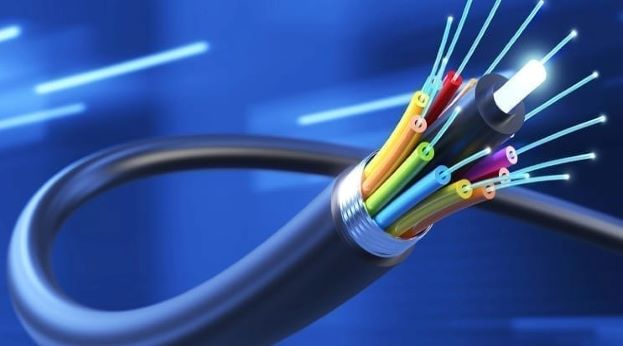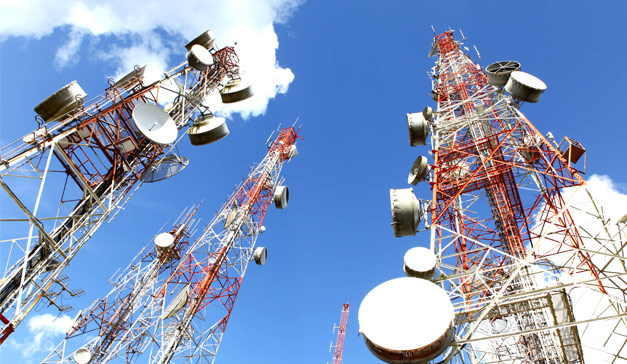Telecom
European Investment Bank Unveils Fibre Plan for 2.5m Africans

As efforts to close the gap on digital divide in Africa accelerate, European Investment Bank (EIB) has unveiled a bold plan to connect more than two million people in the Democratic Republic of the Congo (DRC) expediting the continent’s digitalisation.

The EIB announced on Saturday it is partnering with wholesale telecom infrastructure provider, Bandwidth and Cloud Services (BCS), to roll out new infrastructure in the DRC, and enable high-speed internet coverage.
BCS specialises in fibre-optic connectivity, providing connectivity solutions, reaching more than 80 million end-users, with a network coverage spanning over 12 500 km.
With the DRC project, BCS is expecting to link more than 2.5 million people to the internet, providing them with ‘affordable and more reliable’ digital connectivity
The deployment will also benefit 319 schools and 70 hospitals, which EIB and BCS say is a contribution to DRC’s National Plan for digitalisation.
The EIB and BCS project comes on the back of growing calls to make internet connectivity affordable on the continent.
Africans pay more for connectivity
A study released last year by the International Telecommunication Union (ITU) revealed Africans paid more than three times the global median price for mobile broadband services, and over five times the global median for fixed broadband in 2021.
“Broadband services have ceased to be a mere luxury,” said then ITU secretary-general Houlin Zhao. “They are a necessity for communication, teleworking, online education and other essential services. Still, we must urgently address the issue of affordability if we hope to achieve our goal of universal and meaningful connectivity.”
In the case of the DRC project, EIB’s investment will enable the construction of 1 200 kilometres of fibre, part of the 20 000 kilometres that BCS plans to build in Southern, Central and Eastern Africa over the next three years.
The project is being rolled out under the EIB’s Global Gateway programme, which offers partner countries sustainable connections, and new fibre-optic infrastructure to enable high-speed broadband internet in homes, schools and hospitals.
On Saturday 4 March, the EIB and BCS signed a warrant agreement at the Kinshasa Economic Forum, which will allow the telecoms infrastructure provider to install a new fibre-optic backbone in the eastern regions of the DRC.
The warrant agreement follows a $10 million quasi-equity investment from EIB Global, the EIB’s arm dedicated to international partnerships and development finance.
The financing package addresses BCS’s immediate funding needs to support the company’s long-term growth.
“This is an important milestone in our mission to provide fast, high-quality and affordable digital connectivity in underserved areas in DRC and across Eastern, Central and Southern Africa.
“Our continued partnership with the EIB means we can move forward with our optic expansion plans to build over 20 000 kilometres of digital infrastructure, out of which 12 000 kilometres are in DRC,” said Yonas Maru, founder and managing director of BCS Group.
“This will go a long way to ensure implementation of the memorandum of understanding between the government of DRC and BCS to connect over 1 900 schools, 1 640 public hospitals and government institutions along the BCS backbone and metro fibre infrastructure.
“The government of DRC has in return agreed to waive the fibre licence fee per kilometre and provide rights of way on all public infrastructure – railroad, electricity poles, rivers and lakes – in exchange.”
Thomas Östros, EIB vice-president, commented: “We are very pleased to take this step forward with BCS, as part of the European Investment Bank’s commitment to accelerating digitalisation in the Democratic Republic of Congo and across Africa.
“Digital is such a powerful driver of equity, inclusion and growth, that the EU has made it a pillar of our Global Gateway strategy.
“Expansion of the fibre-optic infrastructure will enable local communities, schools and hospitals to benefit from mobile broadband, which ultimately means new opportunities for learning, for business, for jobs, for healthcare.”
Telecom
Nokia Unwraps 5G Gateway for Home Internet

Nokia has introduced the FastMile Gateway 4, a new 5G indoor gateway designed to deliver high-speed internet throughout the home, powered by Wi-Fi 7 technology.

A gateway is a device that connects to a 5G network and provides high-speed internet access to homes or businesses.
The disclosure was made in a statement by Nokia, which highlighted that the device features high-gain antennas and dual-band Wi-Fi 7 to optimise coverage and boost connection speeds.
The FastMile Gateway 4 supports four carrier aggregation and up to 300 MHz of bandwidth, helping operators improve network efficiency while ensuring seamless connectivity for users.
The new gateway is powered by Nokia’s Corteca software, which enables cloud-based Wi-Fi optimisation and supports industry-standard EasyMesh technology for better network management.
To simplify installation, the device comes with a mobile app that helps users identify the best location for setup.
With the FastMile Gateway 4, Nokia expands its 5G fixed wireless access portfolio, offering multiple Wi-Fi 7-enabled models to support different operator and consumer needs.
The launch underscores Nokia’s commitment to advancing 5G home connectivity, providing faster and more reliable internet solutions.
Shiv Putcha, director for Research and Consulting at GSMA Intelligence, stated, FWA has proven to be a spectacular hit in driving broadband access in the last mile around the world.
He said, “However, there are numerous end users, many with potentially unique requirements that need servicing. Nokia has the broadest portfolio today, with multiple FastMile gateway products that combine 5G FWA with dual-band WiFi 7 indoors.
“This, combined with Corteca management software, will help operators cater to multiple segments of demand.”
Dirk Verhaegen, general manager of Broadband Devices at Nokia, stated, “Using Fixed Wireless Access to connect end customers to the internet requires more than just one type of device.
“Our extensive FWA portfolio gives operators access to a wide range of Wi-Fi 7 devices tailored to meet their unique and diverse needs. Our portfolio is even stronger with the addition of the new FastMile Gateway 4, giving operators another power option to deliver fast, reliable FWA broadband to customers – no matter where they live.”
Telecom
Senate Urges FG, Telcos to Cut Data Cost

The senate has called on the federal government to take urgent action to address the rising cost of data services in the country.

This was sequel to a motion sponsored by Senator Asuquo Ekpenyong (APC, Cross River South) during plenary.
Ekpeyong warned that the surge in data costs was a major setback for young Nigerians who depend on the internet for their livelihoods.
He argued that many young people use digital platforms for freelancing, e-commerce, content creation, and software development, making affordable internet access crucial to their economic survival.
“Telecommunication providers in Nigeria have recently increased the cost of data services by as much as 200%. A move that has placed significant financial strain on millions of Nigerians, especially young people who rely on the internet for their livelihood,” he said.
“Young Nigerians have embraced the digital economy, leveraging the internet for various income-generating activities including freelancing and remote work, direct marketing and social media management, e-commerce, content creation on various platforms, online training, software development, web design, mobile app creation, content creation of various platforms, online education, etc.
“The senate notes that young Nigerians have embraced the digital economy, leveraging the internet for their livelihood, leaving them heavily dependent on mobile telecommunications companies for internet access, and that the sudden and substantial increase in data cost threatens their economic survival and limits access to critical digital services.
“The senate is further concerned that the reasons provided by telecom providers for the data price hike, including high operational costs of favourable exchanges, are untenable, and appears that instead of addressing the root causes of the high cost of doing business in Nigeria, the burden is being unfairly transferred to end-users.
“Senate is aware that the high cost of doing business in Nigeria is driven by multiple challenges, such as increased operational risk and insurance costs.
“The senate believes that urgent government intervention is required to ensure that affordable internet access remains available to all Nigerians, particularly to the young Nigerians who are at the backbone of Nigeria’s digital economy.
“The senate accordingly resolves to urge the federal government to engage with telecommunication providers to review the recent increase in data costs and ensure the pricing remains fair and affordable for all Nigerians.”
Telecommunications operators had increased the cost of data and voice services following the Nigerian Communications Commission (NCC) approval of a 50% tariff hike, implemented on February 11, 2025.
Contributing to the debate, senator Victor Umeh (LP, Anambra Central) described the motion as timely, lamenting that apart from the hike in cost of telecommunications services, there were also a hike in the cost of electricity tariff and DSTV subscription.
“Something needs to be done fast, to regulate the high increases. Citizens have no other way to seek redress,” Senator Umeh said.
Senator Sadiiq Sulaiman Umar (APC, Kwara North), also said, “It’s very important to regulate this social crisis.”
In its resolutions, the Senate also asked the federal government to provide an enabling environment for doing business, as well as address the avalanche of challenges threatening businesses in the country.
The Senate also asked the federal government to consider making provisions for free internet hubs for young people to enhance their socio-economic well-being.
Senate President Godswill Akpabio, who presided over the session said the resolutions if implemented would assist young entrepreneurs who use internet for various businesses to grow.
Telecom
MTN Group, Airtel Africa Agree to Network Sharing in Uganda and Nigeria

Driven to extend digital and financial inclusion across Africa, MTN Group and Airtel Africa have entered into agreements to share network infrastructure in Uganda and Nigeria, while ensuring compliance with local regulatory and statutory requirements.

These sharing agreements target improved network cost efficiencies, expanded coverage and the provision of enhanced mobile services to millions of customers, particularly those in remote and rural areas who do not yet fully enjoy the benefits of a modern connected life.
MTN Group President and Chief Executive Officer Ralph Mupita said operators on the continent were seeing sustained demand for data services: “As MTN, we are driven by the vision of delivering digital solutions that drive Africa’s progress.
We continue to see strong structural demand for digital and financial services across our markets. To meet this demand, we continue to invest in coverage and capacity to ensure high-quality connectivity for our customers.
That said, there are opportunities within regulatory frameworks for sharing resources to drive higher efficiencies and improve returns.”
Airtel Africa Chief Executive Officer Sunil Taldar said: “As we compete fiercely in the market on the strength of our brand, services and our offerings we are building common infrastructure, within the permissible regulatory framework, to provide a more robust and extensive digital highway to drive digital and financial inclusion at the same time avoiding duplication of expensive infrastructure to drive operational efficiencies and benefits for our customers.”
The initiative is part of a growing global trend toward network sharing. By collaborating, telecoms operators can explore innovative and pro-competitive solutions to improve service quality while managing costs more effectively.
The sharing of infrastructure has the potential to enable the delivery of world-class, reliable mobile services to more and more customers across Africa.
Following the conclusion of agreements in Uganda and Nigeria, MTN and Airtel Africa are exploring various opportunities in other markets, including Congo-Brazzaville, Rwanda and Zambia.
Among the types of agreements considered are RAN sharing and those aimed at establishing commercial and technical agreements for fibre infrastructure sharing and, if necessary, the construction of fibre networks.
MTN Group and Airtel Africa are dedicated to working with other mobile operators within the countries in which they have a presence to achieve the advantages of network sharing.
Throughout this process, the parties will continue to function as independent market entities and will compete freely in shared markets. This engagement does not preclude the parties from collaborating with other operators in any respective market.

 News3 days ago
News3 days agoPolice Arrest 4 Bank Staff over Alleged ₦270m Fraud, Money Laundering

 E-Financial3 days ago
E-Financial3 days agoUBA Grows Profit to ₦804Bn, Declares N3 Kobo Final Dividend

 E-Business2 days ago
E-Business2 days agoFG Plans to Link Social Register to NIN for Humanitarian Crisis

 E-Business3 days ago
E-Business3 days agoNIMC to Prosecute Nigerians Printing ‘NIN Cards’, Says Only Slip is Legal

 Telecom2 days ago
Telecom2 days agoKeystone Bank Seeks to Join Suit in Tussle over 9Mobile Shares Ownership

 Telecom3 days ago
Telecom3 days agoOpen Access Fabrics Set to Drive Connectivity to Achieve a Digital Economy

 E-Business3 days ago
E-Business3 days agoUnleashing Nigeria’s Business Potential: The Cloud as Catalyst for Growth

 Broadcasting2 days ago
Broadcasting2 days agoWe’re Confident in the Super Eagles – Karl Toriola















